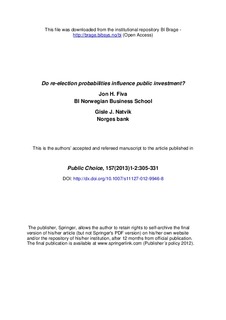Do re-election probabilities influence public investment?
Journal article, Peer reviewed

View/
Date
2013Metadata
Show full item recordCollections
- Scientific articles [2173]
Original version
http://dx.doi.org/10.1007/s11127-012-9946-8Abstract
An insight from dynamic political economy is that elected officials may use state variables to affect the choices of their successors. We exploit the staggered timing of local and national elections in Norway to investigate how politicians' re-election probabilities affect their investments in physical capital. Because popularity is endogenous to politics, we use an instrumental variable approach based on regional movements in ideological sentiment. We find that higher re-election probabilities stimulate investments, particularly in purposes preferred more strongly by the incumbent parties. This aligns with theory where capital and current expenditures are considered complementary inputs to government production.
Description
This is the authors’ accepted and refereed manuscript to the article